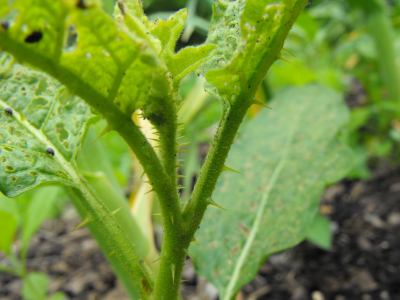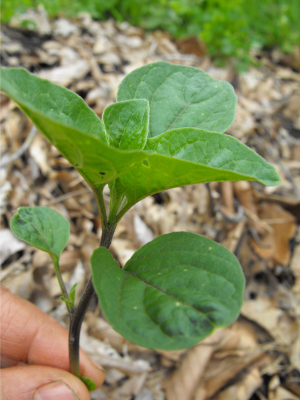
Weedy nightshades
 When
I posted yesterday that weedy
nightshades can carry the potato blight, both Mom and Zimmy asked
me to clarify. Sorry to be confusing --- sometimes the botanist
in me assumes things are obvious when they aren't.
When
I posted yesterday that weedy
nightshades can carry the potato blight, both Mom and Zimmy asked
me to clarify. Sorry to be confusing --- sometimes the botanist
in me assumes things are obvious when they aren't.
Potatoes and tomatoes
are both members of the Solanum genus, which is why they
are able to share the blight. Here in southwest Virginia, we have
two common members of the same genus that tend to spring up as
weeds in pastures and other disturbed areas. Horse-Nettle (S.
carolinense, top
photo) is very memorable
after the  first
time you try to hand-weed it and end up with fingers
full of thorns, while Black Nightshade (S.
americanum,
middle photo) is most obvious in
the fall when it is coated with small black berries (that my plant
manual says are poisonous when raw but can be cooked into pies when
ripe.)
first
time you try to hand-weed it and end up with fingers
full of thorns, while Black Nightshade (S.
americanum,
middle photo) is most obvious in
the fall when it is coated with small black berries (that my plant
manual says are poisonous when raw but can be cooked into pies when
ripe.)
Since both Horse-Nettles
and Black Nightshades share the same genus
with tomatoes and potatoes, they also share susceptability to the
blight and can help the disease overwinter. I call these plants
"weedy nightshades" because all members of the family are sometimes
referred to as "nightshades", and these two species are weeds in my
garden.
Want more in-depth information? Browse through our books.
Or explore more posts by date or by subject.
About us: Anna Hess and Mark Hamilton spent over a decade living self-sufficiently in the mountains of Virginia before moving north to start over from scratch in the foothills of Ohio. They've experimented with permaculture, no-till gardening, trailersteading, home-based microbusinesses and much more, writing about their adventures in both blogs and books.
Want to be notified when new comments are posted on this page? Click on the RSS button after you add a comment to subscribe to the comment feed, or simply check the box beside "email replies to me" while writing your comment.

Everett --- I like the way you think! Flea beetles are a huge problem on eggplant, where they carry a disease that wipes the crop out. That's the big reason we don't grow eggplant --- it's just too much of a pain. Maybe if we planted horse nettles near the eggplant as a trap crop, then destroyed the horse nettles before the egg plant came up?
Shannon --- I'm glad I could help! It's a perennial, so if you want it to go away, you have to dig down to the roots.